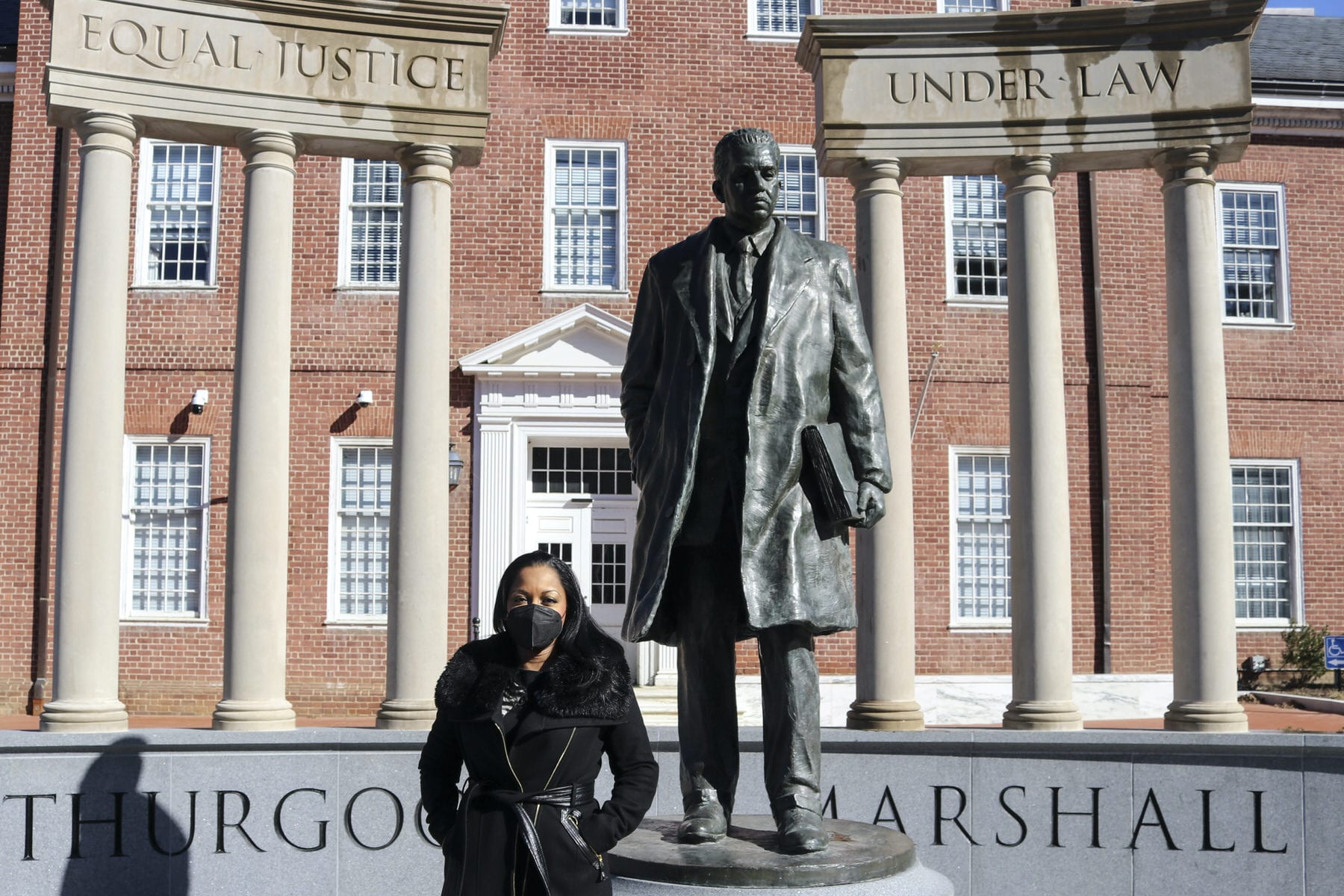Del. Vanessa Atterbeary walked around the halls of the Maryland legislature, surrounded by people in white T-shirts that read: “WE WILL NOT COMPLY.”
It was February 2019, and the Democratic state lawmaker was entering a hearing on her bill to require background checks on the private sale of long guns. The T-shirts were being worn by people who opposed that legislation and related bills up for discussion that day. They argued the bills would restrict their Second Amendment rights. One sheriff even suggested law enforcement officers could be endangered by hypothetical gun confiscations.
Atterbeary’s bill failed that year, as it had the year before — another example of the power of the gun rights lobby.
But that day, the Maryland Capitol was also brimming with other people — predominantly women — in red T-shirts from Moms Demand Action, the national organization that has become synonymous with efforts to curb gun violence. The group supported Atterbeary’s bill, arguing it would close a loophole on background checks for gun sales in Maryland. Atterbeary said seeing the women that day bolstered her confidence that the legislation could happen with time, and it did — a year later.
“I was incredibly proud to be a mom,” she said.
As gun violence continues to permeate American life — it killed more than 40,000 people in 2020, a year with record gun sales — Maryland offers a microcosm of the gun violence prevention efforts playing out in statehouses around the country, against a backdrop of congressional gridlock, mass shootings and daily gun violence.
At the forefront of the debate are women — lawmakers, community organizers and relatives of victims — who are coming back, legislative session after legislative session, to push for gun control measures on the state level.
Andrea Chamblee doesn’t look at her advocacy work as pushing for gun control. Her husband, John McNamara, was one of the five Capital Gazette staffers killed in a 2018 shooting rampage in the newsroom where the shooter used a long gun (one he legally obtained, the Baltimore Sun reported). The next year, Chamblee started showing up at the statehouse to advocate for Atterbeary’s bill and other measures.
“We call it gun violence prevention because that’s our goal, is to prevent gun violence,” Chamblee said. “We don’t need to prevent guns, except for in the hands of dangerous people, and most Americans agree with that. So we’re talking about gun violence prevention.”
This year, the Democratic-led Maryland legislature passed a package of police reform bills that supporters believe will help curb gun violence in part by limiting police officers’ use of force. The legislation repealed a so-called ”bill of rights” for law enforcement officers that decades ago gave broader legal workplace protections to police officers and became a model for other states. After Republican Gov. Larry Hogan vetoed the bills in April, the legislature overturned his move.
The legislature this year also overturned the governor’s veto of Atterbeary’s legislation on long guns, which lawmakers passed in 2020. Hogan had vetoed it in part by explaining his broad support for policies that limit shootings in other ways.
But what gun control advocates see as success has also spurred some legislators to push for expanded gun rights. In predominantly Republican-controlled statehouses, lawmakers this year have passed laws that lift restrictions on obtaining guns. In the final days of Texas’ legislative session last month, lawmakers approved a bill that would allow people to carry handguns without a license or training.
“This is a simple restoration of Texans’ constitutional right under the Second Amendment, a right of the people to keep and bear arms,” Sen. Charles Schwertner, a Republican, said on the chamber floor, the Texas Tribune reported.
Among those opposed to the Texas bill? Law enforcement groups.
“We wouldn’t know who we’re stopping,” Douglas Griffith, president of the Houston Police Officers’ Union, told Houston’s KTRK-TV. “Who is going to have a weapon? Who is not going to have a weapon? Who is trained proficient in that weapon and who’s not? I think it’s very important when you’re talking about people having something that could take someone’s life that they have to be trained in that.”
Earlier in the year, the Republican-controlled Iowa legislature passed a bill that will allow people in the state to buy or carry handguns without a permit. It also removed any background check requirements for unlicensed handgun sales. Republican Gov. Kim Reynolds later signed the bill into law.
Shannon Watts, the founder of the gun violence prevention group Moms Demand Action, started her organization after the 2012 Newtown shooting where a gunman killed 26 people — including 20 students — at a Connecticut elementary school. The organization now has a chapter in every state, but Watts said “the fight to end gun violence in this country is certainly an uphill battle.”
“Our motto from the beginning has been, we have to show lawmakers that when they do the right thing we’ll have their back, and when they do the wrong thing, we’ll have their job,” she said. “And that takes several election cycles.”
Watts is quick to point out data she believes shows there is movement toward gun violence prevention efforts in the U.S. — and that path is through statehouses. Since the Newtown shooting:
- 13 states have passed laws requiring background checks on all gun sales or strengthening existing background check requirements.
- 17 states plus the District of Columbia have passed so-called “red flag laws” that allow the temporary removal of firearms from a person who may present a danger to themselves or others.
- 29 states plus the District of Columbia have passed laws to strengthen policies aimed at preventing domestic gun violence, including laws that prohibit people from buying or having guns if they’ve been convicted of misdemeanor domestic violence crimes or are under final restraining orders.
Atterbeary said the conversation has moved forward in Maryland because of the rising number of women in elective office, and because of the Black women who have pushed for gun violence prevention in the statehouse and their communities for years. She noted that Adrienne Jones, the speaker of the Maryland House of Delegates and the first Black person and woman to hold the position, prioritized gun violence prevention bills this year.
“I do think being a woman, being an African-American woman, being a mother, I mean, all of these things give you a different perspective about policy and how to approach policy,” said Atterbeary, who is also Black. “I absolutely do think that’s key: Who is in office and who is representing folks in the state.”
Atterbeary also applauded Moms Demand Action.
“Big issues have taken huge protests and huge demonstrations and huge lobbying efforts,” she said. “And Moms Demand Action shows up and shows up and shows up.”
That’s partly the work of Danielle Veith, who became a head organizer for the Maryland Moms Demand Action chapter after the 2016 election. She saw a need to increase the group’s presence at the statehouse after just 35 people showed up for a day of lobbying lawmakers. She gradually increased that number to more than 400.
“This has been the best thing I’ve ever done in my life, and I just want other people to be able to have that experience, of being a leader and all the things you learn from it,” she said.
Watts noted that Moms Demand Action has only existed for about eight years. She believes the gun lobby is weaker than it was when the group started its advocacy work. More of the group’s volunteers are running for office and winning. And amid the daily headlines about shootings and other gun violence, Watts doesn’t think federal action can be too far behind, especially with Democrats in control of Congress, albeit with slim majorities.
“This issue is inevitable,” she said. “You just can’t have a country where 100 people are shot and killed every day, and over 230 are wounded, and nothing happens.”







